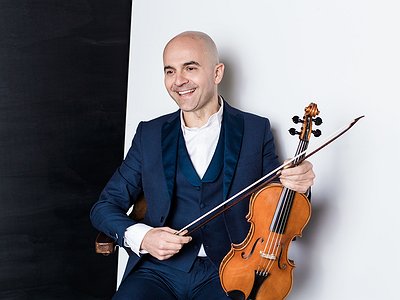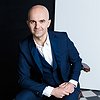Part 1
Name: Alessandro Tampieri
Nationality: Italian
Occupation: Violinist
Current Release: Vivaldi's Concerti per violino with the Accademia Bizantina
Recommendations: A book: The Book of Disquiet by Fernando Pessoa, where, in the form of thoughts and reflections, he paints a literary, sensitive, restless and fragile world of great charm and authenticity. I feel very distant from this way of being; I think, indeed, that my temperament is diametrically opposite. But perhaps for this very reason this is a book that I often leaf through.
A composition (and a composer): The "Responsoria per la Settimana Santa" by Carlo Gesualdo da Venosa. Much less known than the great Claudio Monteverdi, Carlo Gesualdo creates a descriptive musical text of incredibly participatory and modern description, but at the same time formal and fully Renaissance. Again, I would recommend a piece of music that does not belong to my way of being, to my musical world, but that I found very inspiring.
If you enjoyed this interview with Alessandro Tampieri, you can find out more about him and his work by either visiting his facebook profile or the website of the Accademia Bizantina.
When did you start playing your instrument, and what or who were your early passions and influences? What is about music and/or sound that drew you to it?
My first musical memory goes back to when I was 5 years old. I didn't know how to read yet, but the songs that I heard in the parish church I attended had such a power of fascination that I memorised them immediately. It was so easy for me that I convinced my parents to let me join a children's choir practising Renaissance repertoire. This experience was the beginning of everything.
For most artists, originality is first preceded by a phase of learning and, often, emulating others. What was this like for you? How would you describe your own development as an artist and the transition towards your own voice? What is the the relationship between copying, learning and your own creativity?
I believe that originality is an artistic trait that should not be sought forcibly, but it should emerge, if any, from the work that is done every day. The fine line between "original" to "in bad taste" can be very subtle: it is the quality and the awareness of one's own work that makes the difference.
Surely emulating other artists and searching for an aesthetic sense within a well-defined and shared ground are a good way to mature, but it is not the only one. I consider myself more of a craftsman, a music worker, than an artist/bearer of a message from the high spheres of the spirit. The latter attitude is in fact more of a romantic proposition and I gladly leave it to those who deal with this aesthetic in depth. I am fascinated by Vivaldi's craftsmanship, Bach's technical and compositional expertise, Corelli's stylistic purity and then by the freedom to decorate, diminish and complete the compositions with impromptu (or planned) improvisations that I have always practised and for which I have always had a propensity.
What were some of your main artistic challenges when starting out as an artist and in which way have they changed over the years?
I strongly feel my origins as a choir singer and chamber musician. These are my roots, this is my personal style as an artist. The most important challenge is to make music "speak", to effectively express the meaning that I find in it, to be the least "instrumental" as possible and favour the human vocality of the instrument. In fact, I have never felt like a "pure" violinist, perhaps also because of my personal experience with the musical instruments that practised and still practise: I play the violin, but also the viola d'amore; I have been a violist (an instrument that I still teach), but I have also played the lute in concerts and recordings.
In short, a condition of multi-instrumentalism that I believe makes my musical vision distinctive.
Tell us about your studio/work space, please. What were criteria when setting it up and how does this environment influence the creative process? How important, relatively speaking, are factors like mood, ergonomics, haptics and technology for you?
Practising a rather “roaming” life, between concerts and teaching, I have never given much attention to my place of study. All I need is my instrument and a room big enough to be in control of the sound. Of course, at home I have a beautiful view of a maritime pine forest, and this always inspires me a lot!
Tell me about your instrument, please. What was your first instrument like and how did you progress to your current one? How would you describe the relationship with it? What are its most important qualities and how do they influence the musical results, including your own performance?
I played for years an ancient instrument (an excellent Roman violin made by David Tecchler in the first half of the 18th century), but for 5 years now I have been playing a contemporary instrument, made by Marco Minnozzi, a very talented luthier from Ravenna. It's an instrument that was born almost as a bet: Marco, after a concert, told me that in his opinion I would need an instrument with more “leading” qualities, more identifiable and recognisable both by musicians and by the public. “You think so?” I answered. “Then make one for me.”
Within a year I had the violin in my hands and I must say I've been very satisfied ever since. It is an instrument with great character and sound, comfortable under my hands and extremely ductile. It is part of me now and I consider it as an extension of my arm.
Could you take us through a day in your life, from a possible morning routine through to your work? Do you have a fixed schedule? How do music and other aspects of your life feed back into each other - do you separate them or instead try to make them blend seamlessly?
Every day is marked by two regular appointments that I try to attend as much as possible. The first is my daily run, preferably at dawn and in nature, a source of inspiration and energy. The second is the relationship with my instrument, certainly more challenging and with high expectations, but which I have always done with great pleasure and naturalness. I like to think that the two things add up and integrate in my daily training. After all, I first train my legs and heart (with running) and then my fingers and brain (with music): isn't this a complete and wonderful way to spend the day?
Having said that, everything else follows quite messy deadlines, to be able to adhere to family, teaching and "office" commitments, and I like it that way: you learn a lot from perseverance, but you learn even more from the alternation of rules and chaos.
Could you describe your creative process on the basis of a piece or album that's particularly dear to you, please? Where did the ideas come from, how were they transformed in your mind, what did you start with and how do you refine these beginnings into the finished work of art?
The creative process is first of all “presence” in making music and “awareness” of what you are doing. It is difficult to describe it in a few words, and the risk is to appear superficial or inadequate. I can only say that most ideas are formed by intuition: I see a meaning in a musical passage and try to make it credible, first to myself and then to the audience. In records I try to be essential and find a strong justification in everything I add of my own. If something doesn't convince us, we eliminate it without problems (Vivaldi's album "Concerti per il Castello" had, for example, two long cadences that I removed during editing because they were too redundant).
In live concerts, on the other hand, I like to abandon myself to the unexpected and to the stimuli that an acoustic, an architecture and, above all, an audience can give you. This is something I particularly miss in these days of forced "live" inactivity.
There are many descriptions of the ideal state of mind for being creative. What is it like for you? What supports this ideal state of mind and what are distractions? Are there strategies to enter into this state more easily?
Among the many theories and strategies to acquire creativity and concentration, I am convinced that two or three are the points that really interest me. First of all, the relationship with error. It was fundamental, for me, to become aware that an error is not an accident (often regrettable) to which you should never run into, but, on the contrary, it is an opportunity to improve an execution. It is a demonstration of vulnerability that can, however, turn in your favour, if you use it as a “door” to enter “the zone” of perfect concentration.
Moreover, as a passionate runner, I have learned to respect the recovery time that the body asks for, and I try to apply it also to my performances, not so much in physical terms (playing involves very little effort, in comparison with running), but in mental, psychic terms.






